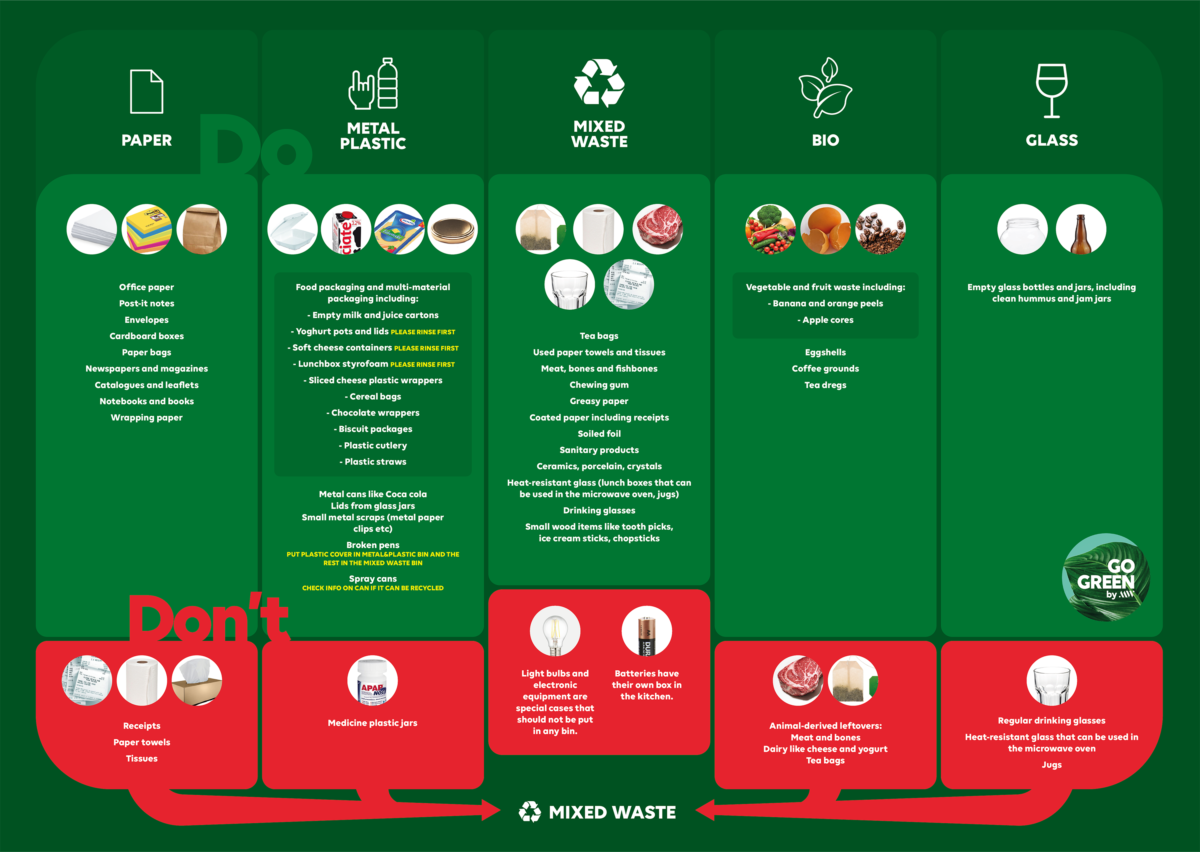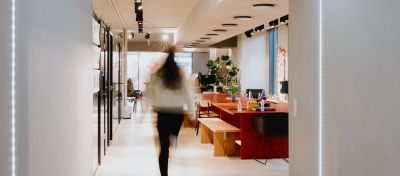A more eco-friendly office: Going green at work
September 13, 2019 / 5 min read

We are constantly reminded of the climate crisis – so why are we doing so little about it? At NoA Ignite in Kraków, we decided to spring into action and see where it would take us. For anyone who wants to steer their own company in a sustainable direction, here are a few tips based on our steps towards a more eco-friendly office environment.
At the beginning of 2019, Greta Thunberg’s school strikes for the climate made headlines across the globe. “Why isn’t anyone doing anything?”, she kept asking. It is a good question – it’s impossible not to be aware of the climate crisis, and still most of us are living, travelling, consuming and wasting as if there is no tomorrow.
A few of us in the office thought it was a shame that such a great company did so little for the environment. Surely we could do better!
Here’s what we have achieved so far.
Steps towards a more sustainable office environment
First of all, we talked to our HR Manager Mirka about setting up a Go green group, and of course she was all for it. But where on earth would we start? It’s not like we have any climate experts in the workforce.
Set up a green Slack group
We decided to set up a green Slack group and invite the whole company to contribute. During a two-week period, we encouraged everyone to post their ideas about how NoA Ignite Krakow could be a greener place to work. After the two weeks, we entered all ideas in an Excel sheet and set up a meeting to go through the ideas.
As you can imagine, there was a lot to go through – from reminding people to turn off the lights through more unusual suggestions like “play music in the toilets to keep people moving” to setting up solar panels on the roof.
Sort sustainable ideas and take action
Next, we went through the ideas and sorted them in three categories: 1) Quick & easy to fix, 2) Need planning/discussion and 3) Future vision. Then it was just a matter of allocating people and start taking action when we had a free moment.
Here’s a summary of the most important things we have implemented so far:
- We keep our Green Slack channel going for sharing ideas and climate-related news and articles.
- We have set up a separate Slack channel for selling, swapping and giving away things we don’t need.
- All printers have been set to double-sided printing by default
- All plastic bottles are gone and have been replaced with water dispensers.
- We invite employees to watch and discuss a short climate-related film in our monthly “Show & Do” sessions – you can see a list of films below.
- The design team helps us to create nice posters as and when needed, which has the added bonus of boosting collaboration between our content creators and designers. An example is the instructions we made on how to use Poland’s new recycling bins in the kitchen – if you want it for your company, feel free to download it here:
- To encourage green and local eating habits, we put up a seasonal veggie calendar on the fridge every month.
- There are reusable lunch boxes in the kitchen, to avoid unnecessary packaging when we get take-away food.
- Our People department is being more eco-conscious when ordering food, gadgets and office supplies, plus when hiring external event providers etc. For our Easter lunch this year, we enjoyed the catering services of Spółdzielnia Równość, a Krakow-based company that employs locals with mental health problems – an excellent initiative we believe. Sustainable business practices go beyond the climate and environment! Since the Easter lunch, our designer Marcin has been helping them to develop a new logo, business cards and graphical elements for their social media – and has plenty more on his to-do-list, time permitting.
- We (usually our content editor Carina) include a green tip in every edition of the monthly company newsletter. You can see the tips we have included so far at the end of this blog post.
Green topics under discussion
How to reduce our electricity consumption
This one is easier said than done. How do we know what the best option is? For example, is it better to use eco-friendly paper tissues or install automatic hand-dryers in the toilets? Should we get lights with motion sensors, or simply put up silly signs to remind people to turn off the lights when they leave the room? Is it worth investigating putting solar panels on the roof when we don’t know how long we will stay in this building?
Climate compensation for business flights
Another biggie is business flights. With offices and clients in other countries, never-ever flying is hardly going to be an option. Sure, we can encourage staff to consider greener options and make better use of online meeting software, but zero flying is hardly going to be possible. Instead, we investigated if major airlines have a scheme that allows for climate compensation through so-called carbon offsetting.
Unfortunately, neither Ryanair nor Norwegian (both of whom we travel with frequently) gave us a straight answer to our questions, so this is something we need to follow up on in the near future.
What we hope to achieve
So, what’s the point of all this when everyone knows that what one person or medium-sized company does is a drop in the polluted ocean? Well. One of the best things we can do for the climate is to start talking about it and spread awareness. And ideas tend to breed ideas, so the more people who take some kind of action for the climate, the better!
Of course, what we have done is far from perfect. Greta is right when she says that nobody is doing enough. And as all these activities are things we do whenever we find a free moment, outside of our regular project work, progress has been a little bit slow. But it’s a start.
Films about sustainability and the climate
Whether you have just started thinking about the climate or are a convinced activist already, you will probably find something worth watching here – a list of films we have watched together or shared in our Green Slack channel recently.
- Friendly guide to climate change (YouTube, 16:52 minutes)
- What if we lost the Amazon rainforest? (YouTube, 05:28 minutes)
- Home (YouTube, 1:33 minutes)
- The story of stuff introduction (YouTube, 21:16 minutes)
- How to transform apocalypse fatigue into action on global warming (TED talk, 14:53 minutes)
- 100 solutions to reverse global warming (TED talk, 16:55 minutes)
- Earth at 2 degrees hotter will be horrific. Now here’s what 4 degrees will look like (YouTube, 7:02 minutes)
- Cowspiracy (Netflix, 1 hour 30 minutes)
More eco-friendly top tips for office workers
Last but not least, here’s a selection of tips taken from our monthly employee newsletter – feel free to steal and reproduce for your own office!
Reduce the aircon by 1 degree
In the summer, we all appreciate the air conditioning in the office. Unfortunately, air conditioning is a major culprit of global warming ☹ – but the good news is that turning it down just 1 degree makes a huge difference. If we keep the room temperature at 23 degrees instead of 22, we’ll save around 615 kwh a month, which translates to around 340 PLN!
Declutter your inbox
An easy thing to do if you want to do something sustainable is to clean your inbox. All your e-mails are stored on servers that consume energy 24 hours a day. The more messages, the more servers are needed. So keep your inbox clean and delete unnecessary e-mails like notifications – for your own organisation as well as for the environment. Read more about cleaning your inbox here.
Keep the fridge full
A full (not overloaded!) fridge needs less energy to cool down the temperature of empty space. So stock up on food and drinks at home to save energy. The same goes for the company fridge: Don’t hesitate to put more stuff in there, it’s actually good for the environment.
Bonus tip: Cold air sinks, so this is the coldest part of the fridge, particularly in the back. That’s why meat and vegetables go to the lower shelves while ready-to-eat food like butter and cheese can be stored higher up.
Be mindful with avocados
Avocados may be good for you, but certainly not for our planet. Their environmental impact comes from the energy, water, fertiliser and pesticide required to grow them, the resources used for packaging materials and the energy used in processing, transporting and keeping them cool to preserve their freshness. Switch to local fruit and veggies which haven’t travelled around the world.
That’s it for now! Are you running or planning similar initiatives in your workplace? If so, please share any further tips and ideas you have in the comments!
Author

Anja Wedberg
Senior Content Editor
Anja is a Senior Content Editor with a background in translation, marketing and web publishing. She spends most of her spare time fighting, either with new karate moves or with Polish consonant clusters. Check out the rest of her blog articles at medium.com/anja.
Related articles
![image of blured woman walking in the office]()
November 8, 2024 / 3 min read
How to implement sustainable IT projects? Employee insights and proven strategies
Sustainability is now a key focus for tech companies. In a recent survey at our company, we learned more about how our employees view sustainability and how they approach it. These...
![image of blured woman walking in the office]()
April 29, 2024 / 3 min read
Mobbing is on the rise; here’s how we prevent it at NoA
What we thought unthinkable in today’s workplace which is increasingly focused on equality, diversity, and social inclusion – is happening. We are talking about the rise of mobbing.



